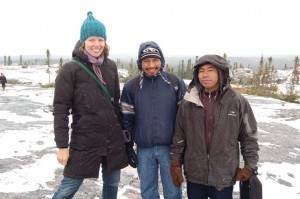Maya
Guatemala
Karine Vanthuyne, professor of anthropology at the University of Ottawa and CICADA academic collaborator, researches issues of memory, identity and indigenous political mobilization. She is partnering with Maya communities in Guatemala to examine Mayan identity as defined by the communities and how it is influenced by historical narratives and present socioeconomic realities.

“I am interested in how Mayan identity is conceptualized by NGOs and intellectuals in Guatemala with the everyday practices and material conditions influencing perceptions of identity in the rural town of Guaisná. The “truth” of past genocide and the experience of ongoing harsh socioeconomic inequality take on different meanings from these two perspectives. And yet inhabitants of Guaisná and Mayan intellectuals share an awareness of past and ongoing oppression, and an understanding of flexible identity as crucial to cultural survival. Thus indigenous people can simultaneously claim some features of “Mayan” identity while also distinguishing it from aspects of local everyday practice.”
-Becoming Maya? The Politics and Pragmatics of “Being Indigenous” in Postgenocide Guatemala
Research on the Impacts of Mining
Academic collaborator Catherine Nolin is partnering with Maya communities to investigate the ways in which the communities are engaging in a participatory dialogue regarding extractive industries. Nolin explores how these referendums are platforms for resistance and life project affirmation with policy-level impacts:

“Since 2005, more than 78 Maya communities representing approximately one million Guatemalans have held referendums called consultas comunitarias, which ask the community whether they are in agreement with mineral, hydroelectric, and/or other megaprojects in their traditional territory. Participation in the consultas is a form of resistance to the granting of mineral rights to corporate interests. In Canada, where much of the Guatemalan mining investment is based, “socially responsible investment firms” (SRIs) promote corporate respect for Indigenous rights. [Through] interviews and participant observation, we highlight the perspectives of Maya consulta organizers in three communities that have undertaken consultas to resist the mining licenses of the Canadian mining company Goldcorp, Inc. A strict policy of corporate respect for the right to free, prior, and informed consent of affected communities is a minimum requirement for Maya acceptance of SRI legitimacy.”
-Consultas and Socially Responsible Investing in Guatemala: A Case Study Examining Maya Perspectives on the Indigenous Right to Free, Prior, and Informed Consent
